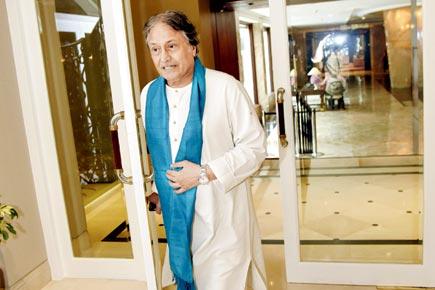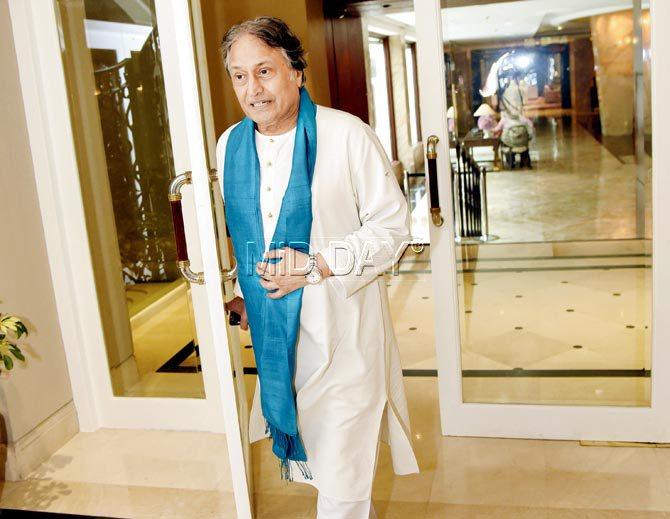Ustad Amjad Ali Khan on why music has no LOC, and how both nations must protect their people and culture


Ustad Amjad Ali Khan will perform at a concert titled Music for Vision at NCPA on Thursday. Pic/Pradeep Dhivar
ADVERTISEMENT
The Gwalior gharana is regarded as an iconic repository within the Hindustani Classical genre that celebrates greats such as Miyan Tansen. Sarod virtuoso Ustad Amjad Ali Khan is a disciple of the sect started with the reign of Mughal emperor Akbar in 1542. The royal blood reflected when he adjusted his blue scarf (known as uttariya which is hung around the shoulder) several times during a conversation, and greeted a stranger with a 'namaste'. At 71, he is reinventing himself by collaborating with Western Classical ensembles. When the government is contemplating a ban on exchange of the arts between India and Pakistan after the Uri attack, Khan sahab (as he is called) avowed the immortality of musical notes. He is in the city for a concert titled Music for Vision with American violinist Elmira Darvarova and conductor George Mathew. Excerpts from an interview.
You were one of the first from India to visit Pakistan for a concert after the Partition. Does the arts exchange ban hurt you?
Music has no boundaries and, historically, it was one nation. Due to political reasons, the land was divided, but music remained as it is. Swar ke tukde nahi ho sakte (you cannot fragment musical notes). It will still be called Indian Classical music. I visited Pakistan in 1981 after 25 years of cultural silence. Natwar Singh was the ambassador and Mani Shankar Aiyar was the Consul-General in Karachi. I received a lot of love and appreciation. Artistes like Roshan Ara Begum and Farida Khanum attended my concert.
Do you think a new identity could have been created merging talents from both nations?
They don't have an identity; a new country cannot have one. It is a part of India and the culture is the same. There are so many relatives of Indian Muslims, and vice versa. My heart aches for the people who are losing their lives. There are so many young soldiers. I don't understand why we are still fighting. Is every Indian and Pakistani happy and rich? The answer is no. One should take care of their own country and keep people happy. There are lots of people who live without water and electricity. Nobody should try to attack another nation because your countrymen aren't satisfied with you. How can you attack another nation to conquer land? You cannot afford to do that. I feel sad that people are dying in the name of terrorism. It's time to show solidarity towards our jawans and armed forces who are sacrificing their lives so that we can be safe.
Is something wrong with our education system in terms of music and academics?
There could be. No teacher asks a child how is he doing or how his parents are? It is straight to the textbook. There is no communication; it is all about 'Mathematics kholo' and 'English kholo.' On top of that, schools, colleges and even hospitals have become money-making industries. Today, patients are called clients. The whole approach is commercial. The rich parents are happy admitting their children into swanky five-star schools, but I believe they shouldn't produce children if they do not have time. They may adopt a kid then. If you cannot provide time, it is inhuman.
Talking about your concert, what do you take back from the Western Classical collaborations?
A lot of Indian musicians criticise musicians from the West because they play music from the sheets. It is easy to point fingers but I believe every system has certain limitations. Their system is that they write and they read. I appreciate that. I always enjoyed Ludwig van Beethoven and Johann Sebastian Bach. They produce beautiful music collectively with around 150 musicians. In our country, if so many musicians unite for a concert, they may just break each other's heads. I am enjoying it. This is the first sarod confluence, with a whole orchestra.
Has this partnership come late?
Everybody is struggling to become a Prime Minister in India, nobody is happy just being a minister. We couldn't create a beautiful piece in spite of 200 years of British rule. We missed out on their orchestra. Hence, we mostly had solo and duet musicians. When Indira Gandhi died in 1984, All India Radio asked me to compose a piece. After years, in 2009, I finally received an invitation from Scottish Chamber Orchestra. They trusted me and requested me to compose for them. It is a good learning process. The music conductors could read my mind, they wrote for me because I cannot read sheets. I also tend to forget. We named this confluence of culture Samagam.
How did you get around the UK visa problem you faced recently before one of your performance there?
I am grateful to British High Commission for finally granting me a visa. However, I understand that a country is not obligated to give a work visa to any individual. Seeing the response at Royal Festival Hall last month, it was obvious that they sincerely wanted me to perform in London. That was one of my most memorable concerts in London.
How many ragas comprise the confluence?
There are many; I don't want to pressurise my listeners into thinking about their ragas. They are all melodies. They should never think about the raga, they should enjoy the music. The one who knows music may understand but even if they don't, it is fine.
Talking about learning, where does one access archives to help them start?
In our younger days, there was only All India Radio. It became a guru to many. A lot of people learnt listening to the radio. Stalwarts learnt listening to other musicians on the radio. Now, people have access to CDs, recordings and YouTube. Listening is learning. Earlier, the students used to serve the guru as domestic help but times have changed. I learnt music to understand the grammar; I am still learning. Every human being has a different reason to learn; others learn to sing on television, some to sing in films, some to cut an album but a few are learning to surrender to music.
Tell us a bit about the recently-released album Amalgam?
Amalgam is the brainchild of all the participating musicians, especially my sons Amaan Ali Bangash and Ayaan Ali Bangash who have put their heart and soul in it. The involvement and the passion of Elmira towards Indian Classical music is unbelievable. She has played every raga, every composition with sincerity.
Which ragas do you associate with Mumbai?
I have played Raga Darbari, Malkauns and Mia Ki Malhar on several occasions when IâÂu00c2u0080Âu00c2u0088have played in Mumbai.
Do you remember your first concert?
I performed in Kal Ke Kalakar music festival held at Chhabildas Boys High School in Dadar in 1959-60. I have fond memories from the tour.
On: October 20, 7.30 pm
At: Tata Theatre, NCPA Marg, Nariman Point
Call: 22824567
Cost: Rs 500 onwards
 Subscribe today by clicking the link and stay updated with the latest news!" Click here!
Subscribe today by clicking the link and stay updated with the latest news!" Click here!






